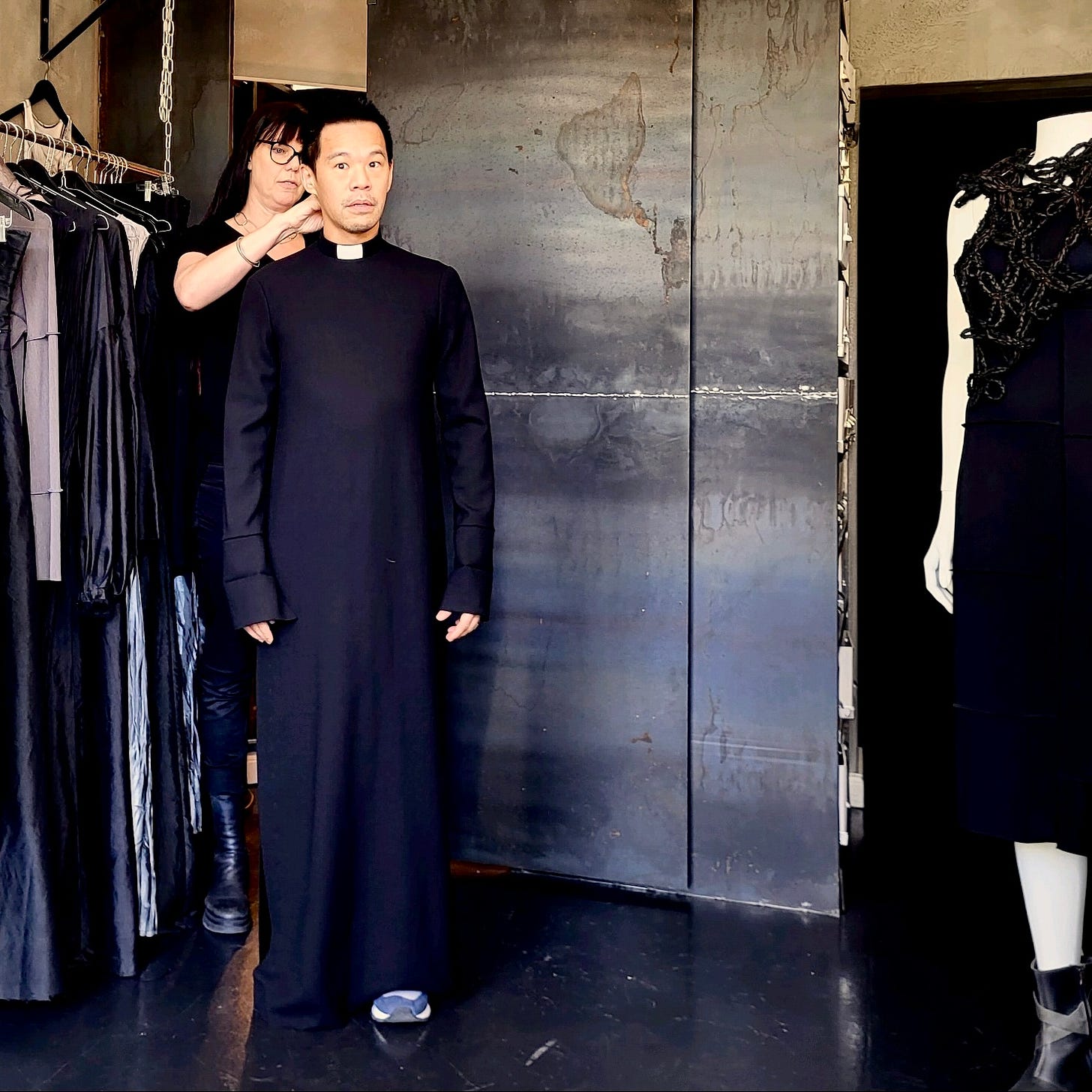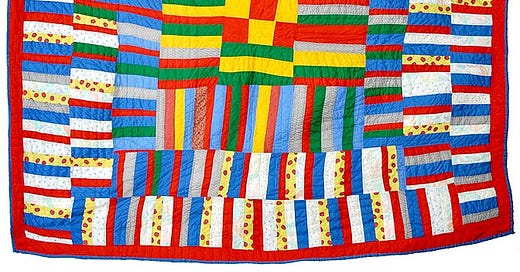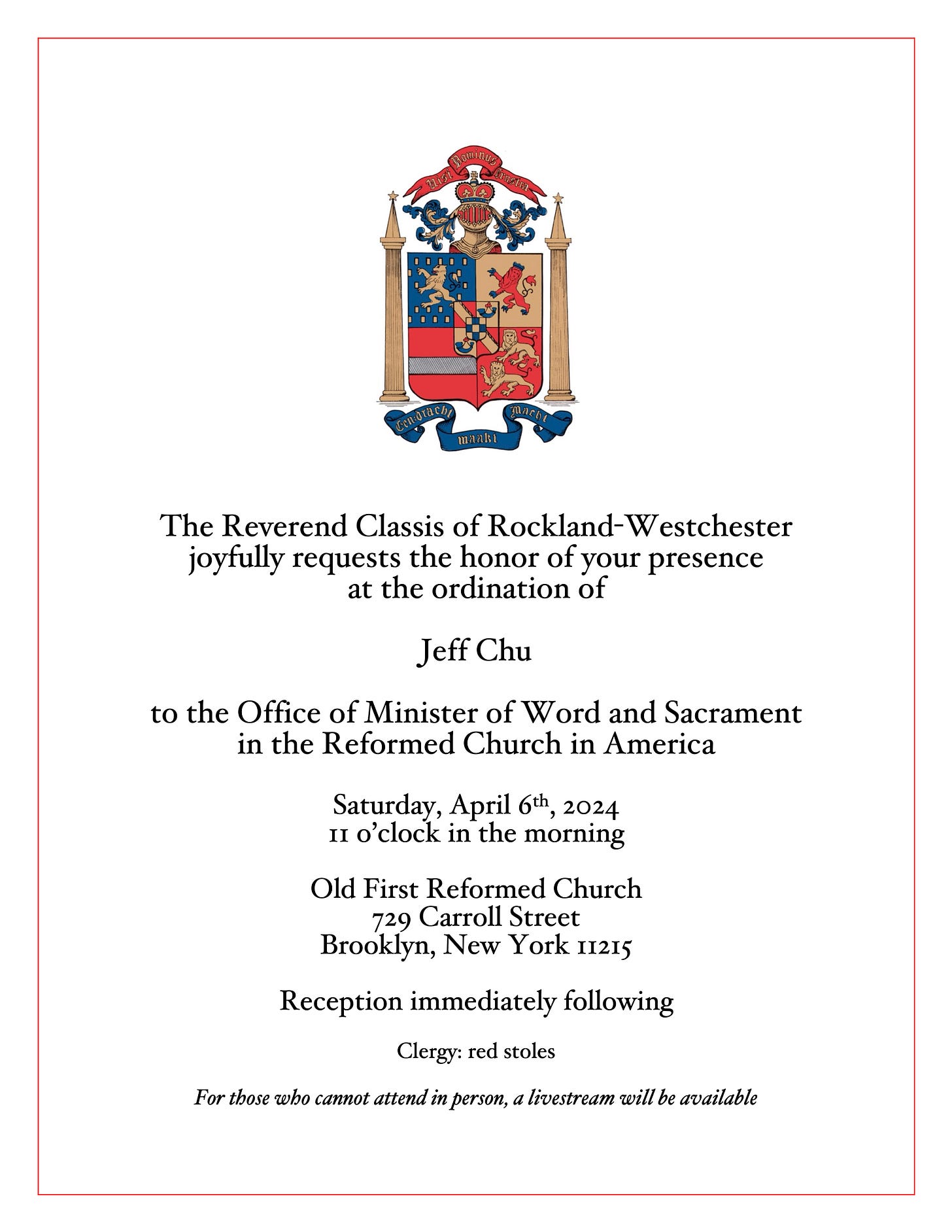What Is Saving Your Life Now?
Some fragmented thoughts on the hellishness of the world, snippets of poetry, glimpses of salvation, and—at long last?—my ordination
Friday, January 26
Grand Rapids, Mich.
In her book An Altar in the World, Barbara Brown Taylor recalls being invited to preach at a church in Alabama. She asked the priest in charge, “What do you want me to talk about?” He replied, “Come tell us what is saving your life now.”
He didn’t mean that in the grand cosmic sense, not in the forever and ever, but in the here and now.
“It was as if he had swept his arm across a dusty table and brushed all the formal china to the ground,” Taylor writes. “I did not have to try to say correct things that were true for everyone. I did not have to use theological language that conformed to the historical teachings of the church. All I had to do was figure out what my life depended on. All I had to do was figure out how I stayed as close to that reality as I could, and then find some way to talk about it that helped my listeners figure out those same things for themselves.”
There is so much formal china in the world and in our lives—so many rules and regulations, so many policies and procedures, so many gatekeepers and etiquette experts who will lecture you on the dos and don’ts, the rights and the wrongs, the words to use and those that should never be uttered. Taylor has always had a beautiful way of cutting through all that, to the marrow of the matter. Here, once again, she sees past dogma and doctrine to identify something important, something human, underneath it all: How are we getting through this life? What enables us to survive?

This world can seem a monstrous maelstrom. The whirling, swirling mess of things is too much. Next month, Ukraine will mark two years since Russia’s full-scale invasion and ten awful years since the beginning of the war. So many families in Israel are still awaiting the return of their beloveds, while Gaza’s people continue to persist in the face of an inhumane onslaught that has destroyed so much of their lives since October 7th. Here in the U.S., we are bracing for yet another presidential election season marked by folly and fear. There is no room, even in our ever-expanding coverage, to chronicle all the devastation humans wreak on one another and this good earth. Everywhere, we encounter so much violence and so much hatred.
What is saving our lives now? Where do we find our salvation?
I don’t mean that in the grand cosmic sense, not in the forever and ever, but in the here and now.
I’ll be the first to admit that I wish God would come riding down on a shining chariot, waving a gentle yet strong hand, banishing evil and imposing good. But grand solutions and cosmic anything feel so far beyond us now, and I don’t know how to get to the forever and ever without moving through these next few minutes and days. To find an echo of good news, to identify some hint of hope, might be to taste a morsel of nourishment and to feel a cool drop of water on our parched tongues.
What is saving our lives now? Where do we find our salvation?

A couple of months ago, I bought for my study a print made by Noam Sienna to raise money for Standing Together, a movement that seeks a peaceful future for both Jews and Palestinians in Israel, and for the Palestine Children’s Relief Fund’s Gaza efforts. A Jewish artist and historian who is currently a postdoc at the University of Toronto, Sienna is something of a polymath. This print combines lines, in Arabic and Hebrew and English, from the poetry of Mahmoud Darwish (“A Soldier Dreams of White Lilies”)—“I want a smiling child meeting the day with laughter/ not a piece of the war machine”—and Yehuda Amichai (“Wildpeace”)—“Let it come like wildflowers, suddenly,/ Because the field must have it: wildpeace.”
Smiles. Unfettered childhood. Daylight. Laughter. Wildflowers. Fertile fields. Poetry. Art: Every single one is a grace. Each is a sign of salvation.
“I want.” “Let it come.” “Must have.” Even such expressions of longing, even such naming of unanswered questions—how? when?—point us toward possibility.
What is saving our lives now? Where do we find our salvation?
It’s curious to me that many Christians, including those in the churches of my childhood, are so fixated on the eternal suffering of our imaginations and relatively unbothered by the everyday torment that humans are inflicting on one another. We focus on what is out of our sight and beyond our reach. But in our lust for the sweet hereafter, we ignore or diminish the palpable pain of the very present, spilling our balm carelessly and wasting the salve that we already have.
I honestly don’t know what I believe about that enormous and otherworldly hell anymore, but I do see the debris and destruction of the little hells we keep creating all around us. And I suspect that the love that can save us will not be unfurled from on high like some seamless blanket of whole, all-comforting cloth. Jesus already told us what to do. He already showed us how salvation comes—with the repair of relationship and the restoration of belonging, person by hurting person, community by aching community. I imagine it’s much like a patchwork quilt is made, piece stitched by painstaking piece, from the remnants we have and bring.
You bring a bit of well-loved denim. I’ve got a fragment of corduroy. With a scrap of threadbare cotton here and an unexpected snippet of gorgeous silk brocade there, perhaps a saving love will arrive in the holy and binding thread that answers the open and waiting question between two squares seeking a greater whole.
What is saving our lives now? Where do we find our salvation?
In courageous uncertainty and in wholehearted lament. In thoughtful conversation and patient listening. In every act of mercy and every gesture of grace. In the glimpses of beauty and the resurrection of wonder. In the bread that sustains us for the sacred work and in the cup of blessing that has been poured out. In collective and loving labor. In all the small things that quietly meet us amidst our cries and spur us on toward the cobbling-together of greater good. In the humble testimony of those who have seen salvation, if only at a distance and in part.
So tell me—tell us—what is saving your life now.
What I’m Reading: As I was writing to you this week, my friend Nadia Bolz-Weber coincidentally posted her own reflection on salvation, in response to a question from John, one of her readers: “What does the language of ‘saved’ mean to you?” As always, Nadia was so thoughtful and so wise in her answer. “The root word for salvation in Greek is sozo which means wholeness,” she writes. “I love that, John. Because that I could use. I could use the repairing of fractured relationships. I could use the bringing back together of mind, body and spirit. I could use every reminder I can get that I am already whole. There isn’t a supplement or elimination diet, or guru that can make me what I already am: Saved. Whole. Loved.”
Some news: I wrote to you last July about receiving a certificate from my denomination that I needed to continue on my path to ordination. “I’m still waiting for the local authorities to confirm that I’ve done everything I have to do,” I said then, “but I hope to be ordained as a minister of Word and sacrament later this year.”
I have to laugh a little as I reflect on those words, because even when I think I am accounting for church time, somehow my calculations are a little off. One of the last hurdles: I needed what’s known in ecclesiastical bureaucratese as an “ordainable call.” I could rant all day about the annoying peculiarities of how this is interpreted—it’s maddening that the work at my church in North Carolina is not considered ordainable. But my rants will never be my rescue. In this case, it was the good people of the First Presbyterian Church of Berkeley who came through with a position that has been deemed ordainable.
I guess it’s fitting that my church work will be bicoastal and ecumenical and idiosyncratic—and earlier this week, my local authorities did finally confirm that I’ve done everything I have to do. So, God willing, I will be ordained as a minister of Word and sacrament in the Reformed Church in America on April 6.

This has been a long, long, long road. In my denomination, the ordination process typically takes three years. I think, by the time I take my vows, I will be just shy of eight. I’m a little tired. There have been so many moments when I was ready to give up, when I wondered whether I had misheard the call. But every time, there has been some voice—my beloved Tristan, a friend, sometimes a stranger—saying, occasionally in word but usually in deed: “Hang on.” “Be patient.” “You really are called.”
When we moved to Grand Rapids—four years ago last week!—for me to take my first church job, my friend Noah made me a playlist to accompany me. One of the songs on that playlist, “Your Labor Is Not in Vain,” by the collective The Porter’s Gate, has been particularly meaningful. “Your labor is not unknown/ though the rocks, they cry out, and the sea, it may groan,” it goes. “The place of your toil may not seem like a home/ but your labor is not unknown.”
Wherever your faithful labors find you now, whatever is weighing you down and making it just a little harder to put one foot in front of the other, I offer this song to you as it was offered to me—in a spirit of encouragement and solidarity.
My ordination service will be at Old First Reformed Church in Brooklyn, N.Y., at 11 a.m. on Saturday, April 6th. Whether you’re Reformed or not, churchy or not, Christian or not, you’re more than welcome. I’d be so delighted to see you there.
If you’d like to be there but for whatever reason can’t physically make your way to New York, we’re planning to have a livestream, and I will share those details closer to the date. And regardless of whether you can join us or not, please keep me in your thoughts and prayers; the ordination vows are no joke.
Thanks for being alongside me. Your companionship means more than I can express in words.
Yours,
Jeff







I love this because I am a literal quilter who has dealt with some big losses this last year - the death of my mom on Sunday being at the top of the list - and spending a little bit of time quilting by hand each day is saving my life - up and down up and down - breathe in and out - in and out. Putting together all these little pieces to make something beautiful has been a kind of a prayer and is a long term act of hope.
What is saving my life right now? You, the people in this community, and others who point me to hope. To love.
And my dog Roxy. ☺️
Congratulations on your ordination, Jeff. I am thrilled for you.